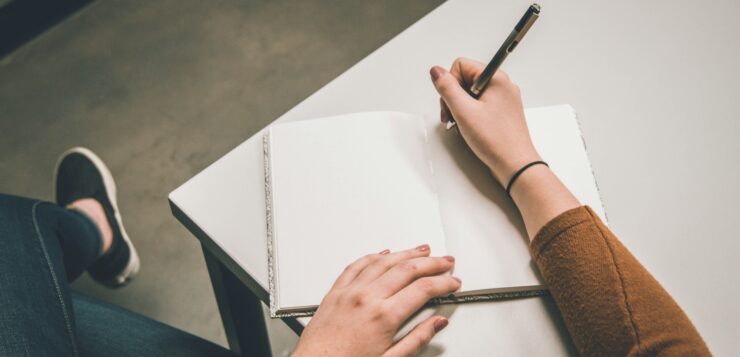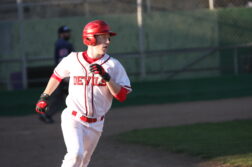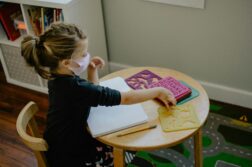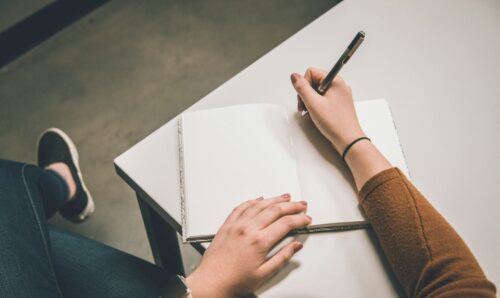
Nan I Think I’m Bi was published in December of last year. My first book, my childhood dreams of both being a published writer and receiving lots of attention for it, had finally come to fruition. It’s a lighthearted read, chronicling ten different people’s stories of coming to terms with their bisexuality or bi-curiosity, including my own experience. Has my family seen the book cover? Yes. Have we talked about it? No.
I always knew I was bisexual; I grew up romanticizing men but having crushes on women. For a long time, I worried I was a lesbian, partly because I feared rejection from my family, but partly because I just really wanted a boyfriend to show off. I breathed a huge sigh of relief when I got felt up by a boy for the first time at the age of fourteen. His name was Drew, he was ugly and fancied my best mate, but he was a really good singer, so to my musical theater-obsessed teenage brain, he was a catch. Drew didn’t offer much, but he did confirm my heterosexuality. ‘Phew,’ I thought at the time, ‘I do like boys in that way.’ Things went downhill from there.
It’s really difficult to explain what shifted with my sexuality. I spent my twenties in monogamous heterosexual relationships with an unsatisfying sex life and no orgasms. I frequently thought of women, but could barely admit it to myself, let alone go out and explore it. A drunk make out with a female colleague was as far as I went.
Something happened when I hit twenty-six. You could say my brain finished developing, you could say I was sick of the lack of orgasms, you could say that I had enough failings in my adulthood to realize that life was too short. I started being more open with myself about fancying women. I even went gay speed dating with a lesbian friend. We were both really bad at it; she liked the emotionally unavailable woman in the room, and all I could talk about were hair care regimes. I’d spent a lifetime flattering, adoring, and feeling a genuine platonic love for many women, and I couldn’t quite figure out how to break away from it. It was difficult to come to terms with my bisexuality when I felt like I was already failing at heterosexuality.
Then I met Harry.
Harry was the greatest
On our first date, he told me how he checked out my standup comedy online and mentioned an allusion I made to be being bisexual. He asked if I was. I found myself immediately defensive, gearing myself up for the usual misguided encouragement, usually followed by a barrage of questions about which sort of women I’d like to go down on or would consider for a threesome. I don’t know. I wanted to shout: I’m still figuring that out myself! Can you let me figure it out myself before you start bastardizing it for your own gratification? Not that I ever said that. I was more a cowardly, responding: “I don’t know, tee hee.”
But Harry didn’t do any of that. He just sat across from me, enjoying his deep dish pizza and shrugged, “That’s cool. Well, me too.”
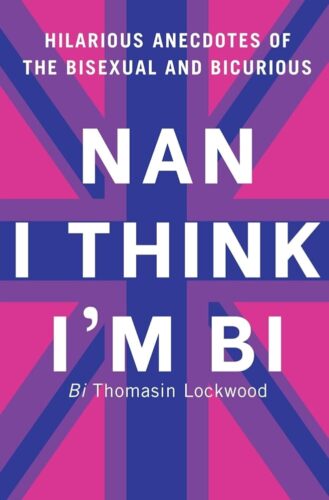
I started feeling more liberated in my own sexuality, and could look at my feelings in a kinder, less judgmental way. I decided that I wanted to share my story; I wanted to write a book. Interviewing many bisexual men, it was interesting to see a mirrored experience. As a bisexual woman, I was widely accepted when I outed myself; many people even celebrated it (some a little too much). Despite this, I had no idea how to initiate something more physical with women. Through my conversations with other bisexual people, it was clear to me that the bisexual coming out experience was not monolithic, and that it could be awkward, sexy, embarrassing and liberating. I was so proud of writing something that gave the spotlight to an often overlooked or misunderstood experience. Then I realized: I was going to have to come out to my family.
This might not have been a problem if I wasn’t so excited about the fact that I was going to be a published author, so I immediately told my sisters, who told my parents, who told their parents, who told my uncle and cousins. I stayed tight-lipped on the subject. “You’ll find out when it’s out.” I’d say, and they’d laugh, thinking it was some kind of humble method of keeping the subject of my book a secret, as a serious writer. My brother, a professional with a PhD, was also publishing a book, so his sensibilities took the heat off me somewhat.
My Dad told me how he’d put both of our books on his shelves and tell all of his friends to buy them. “Please don’t.” I warned him. “Or if you do, please don’t read it.” I was afraid of rejection from my father and his side of the family. Even if they accepted me being bisexual, they might find it uncouth to tell the whole world about it. I’m no pessimist but I knew how difficult it would be to market. My publisher, Vulpine Press, was hopeful, but I knew deep down the first people to be reading the book would be my family and friends. So, I decided to lean into it. The title wasn’t just to catch the eye of a stranger browsing for their next holiday read, but a genuine coming out.
So, when the book came out, so did I. I begged my Dad once again not to read it, skirting round the subject matter. “That’s fine,” he said, “Lindsay is reading it instead.” Lindsay is my step-mother.
I am sure that they have all talked about my novel without me present. No news is good news, I think.
Shortly after the book was released, I met my siblings outside the coffee shop with a cautious, “how’s it all going?” I chose to start the conversation by talking about getting published in general, avoiding the topic of the book. And I guess I didn’t want to. I’d like to think my queerness has always been obvious to them anyway (a tale as old as time). The next time I saw my extended family, my uncle grabbed the book he’d purchased off the shelf and asked me to sign it. There was pride, but no prejudice. Just a simple, “Congratulations on writing a book! I’d love to write a book.” I guess this is the British way?
As for my Nan… well, in all honesty, I still don’t know what she thinks. She hasn’t asked. Did my Dad or uncle tell her not to? I won’t be asking. That is, also, indeed the British way.
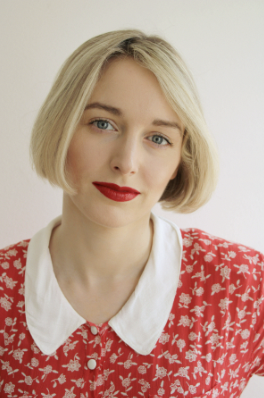 Thomasin Lockwood is a British actress, writer, comedian and content creator. You can find her on TikTok or Instagram. Her new book, Nan I Think I’m Bi, published by Vulpine Press, is out now.
Thomasin Lockwood is a British actress, writer, comedian and content creator. You can find her on TikTok or Instagram. Her new book, Nan I Think I’m Bi, published by Vulpine Press, is out now.


